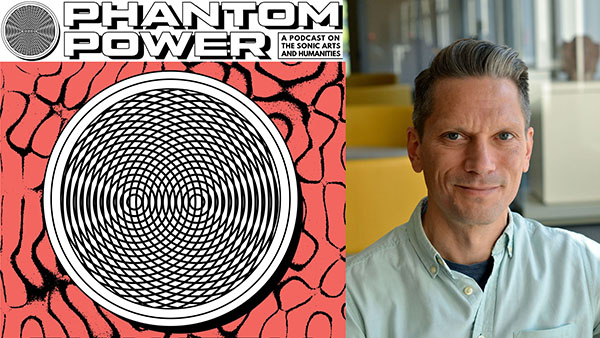Phantom Power podcast shares the stories and work of some of the most innovative creators and scholars working in sound
“Today, scholarship needs to be translated to other media because people expect to take in information through video and podcasts,” host and media scholar Mack Hagood said

Phantom Power podcast shares the stories and work of some of the most innovative creators and scholars working in sound
Phantom Power, the podcast that takes listeners on a sonic journey through the arts and humanities, dives deep into the world of sound to ask provocative questions that resonate across the human experience.
How does sound affect us? What can it tell us about our relationship to the environment and the animal world? Is the politics of a given era reflected in the sound of its music? Does race have a sound? What is the meaning of silence?
These are just a few of the mysteries that host and media scholar Mack Hagood, the Robert H. and Nancy J. Blayney Associate Professor of Media and Communication at Miami University, attempts to unravel.
Now entering its fourth year, Phantom Power is already used in university classrooms across the U.S. and around the world. And Hagood’s recent book chapter, “The Scholarly Podcast: Form and Function in Audio Academia,” connects podcasting to the wider scope of his academic research.
“We are in a moment when scholarly knowledge no longer needs to exist only on the written page,” he said, “but scholars are still figuring out how to make podcasts work within the traditions and structures of the academy. Today, scholarship needs to be translated to other media because people expect to take in information through video and podcasts. And podcasts have the advantage of being relatively cheap to produce.”
It’s an idea that will continue to propel both Phantom Power, and podcasting as a medium, forward.
“Phantom Power shares the stories and work of some of the most innovative creators and scholars working in sound,” Hagood said. “It explores the sounds and ideas of artists, technologists, producers, composers, ethnographers, historians, cultural scholars, and philosophers. My favorite episodes take me deep into a community or environment that I didn’t know much about.”
Past episodes feature:
- A folklorist immersed in the sounds and history of Houston’s hip hop car culture.
- A sound artist who mics NYC rat burrows to reveal how rats sing to one another.
- An Iranian sound artist who grew up as a heavy metal fan in an Islamic theocracy before becoming an internationally acclaimed composer.
“And we recently did an entire episode on the voice of Yoko Ono!” Hagood adds.
Aimed at both serious scholars and general audiences alike, the podcast is funded through the National Endowment for the Humanities, and Hagood has also appeared on several mainstream media platforms including the New York Times, The Atlantic, The Wire, the Freakonomics podcast, and more.
More recently, he has begun to explore the possibilities and potential of podcasting as a new form of scholarly discourse.
“Currently many academics are mainly making podcasts for their own peers, which is great, but there is untapped potential for scholars to make polished and entertaining audio work that explains important and complex ideas in ways that non-experts can engage with,” Hagood said. “The huge success of companies like The Great Courses and MasterClass prove that people are hungry for knowledge.”
More episodes of Phantom Power are available now on Apple Podcasts, Google Podcasts, and Stitcher.